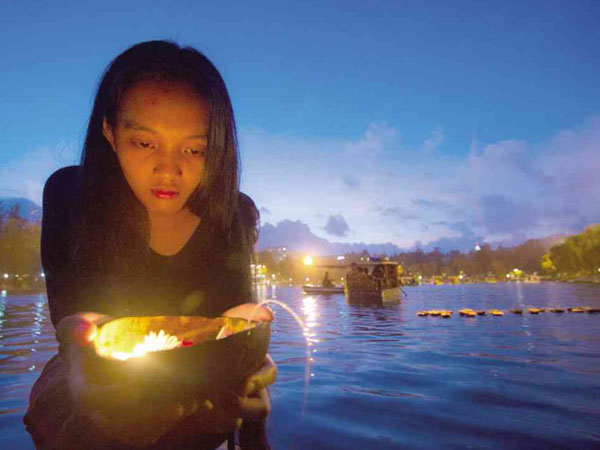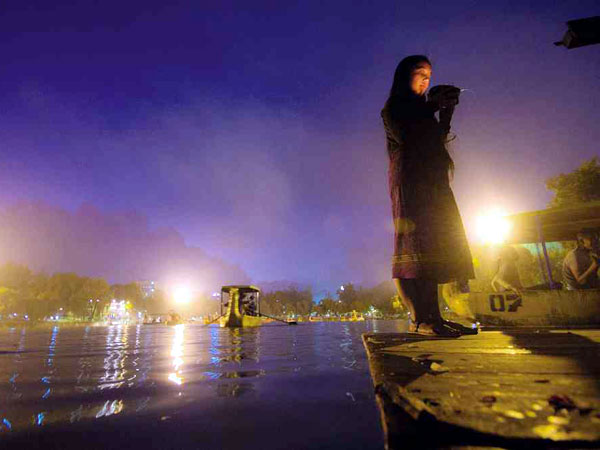Baguio advocates appeal to ‘spirits’ to clear way for RH law

OFFERING TO THE SPIRITS Performing artist Florenda Pedro, aka “Dumay Solingay,” holds one of the 55 coconut shells with lighted candles and flowers that floated at Burnham Lake in Baguio City at sundown on Tuesday. The event, called “Atang ti Karurua” (Offering of the Spirits), was held in connection with the passing of the reproductive health law. RICHARD BALONGLONG/INQUIRER NORTHERN LUZON
BAGUIO CITY—A spirit boat, laden with flowers arranged into a purple ribbon, sailed at Burnham Lake when dusk fell in the summer capital on Tuesday.
The boat, which was trailed by 55 coconut shells filled with lighted candles, was dedicated by Baguio artists and advocates of the Reproductive Health Act of 2012 (Republic Act No. 10354) to the mothers and children who died during childbirth.
The advocates massed up here to urge the Supreme Court to put an end to the constitutional challenge against the RH law, which has been frozen by a restraining order.
The spirit boat was the group’s “Atang ti Karurua” (offering to the spirits), a Baguio tradition started by the late artist Roberto Villanueva to honor the people killed in the July 1990 Luzon earthquake.
Artist Florenda Pedro performed the “Dance of the Young Mothers” as the spirit boat floated.
The boat was crafted by artist Jason Domling out of reed. The floral arrangements were designed by Baguio florist Antonio Paulite, who arranged Malaysian mums into the ribbon atop a white cloth. Rose petals were scattered around the symbol.
Paulite said the design was an expression of how he felt for the mothers and children who died during labor.
“This is all about the journey of souls,” he said. “This is my offer to them, to appease their spirits [as they journey to a different plane much like] the boat floats around the lake.”
Paulite said the flowers were also offered to pregnant teenage mothers. The 2010 State of the Filipino Teenagers Report of the National Statistics Office recorded 8,473 teenage marriages that year.

FLORENDA Pedro, aka “Dumay Solingay,” a performing artist, holds one of 55 coconut shells with candlelights and flowers that are floating on Burnham Lake at sundown. The candles are an offering to the spirits for obstacles to the RH law to be removed. RICHARD BALONGLONG/INQUIRER NORTHERN LUZON
Chi Laigo Vallido, advocacy specialist of the Forum for Family Planning and Development Inc. (FFPDI), said the activity dramatized the need to enforce the RH law.
“If there is no RH law, there will be no budget that will be allotted [for reproductive health care and] the number of maternal mortality cases will just increase,” she said.
The FFPDI said maternal mortality remains high at 221 maternal deaths per 100,000 live births. This number is equivalent to 14 to 15 mothers dying every day in the Philippines due to pregnancy and childbirth related complications.
“Reproductive health is beyond [the debates surrounding] contraceptives or family planning. Young people are faced with alarming RH issues,” Vallido said.
She said their records showed that 206,574 babies were born to mothers aged 15 to 19 years old in 2010.
“There are incidences of pregnancies [for mothers] as young as 11 to 12 years old. Their maternal mortality is at high risk as their bodies have not yet fully developed,” she said.














